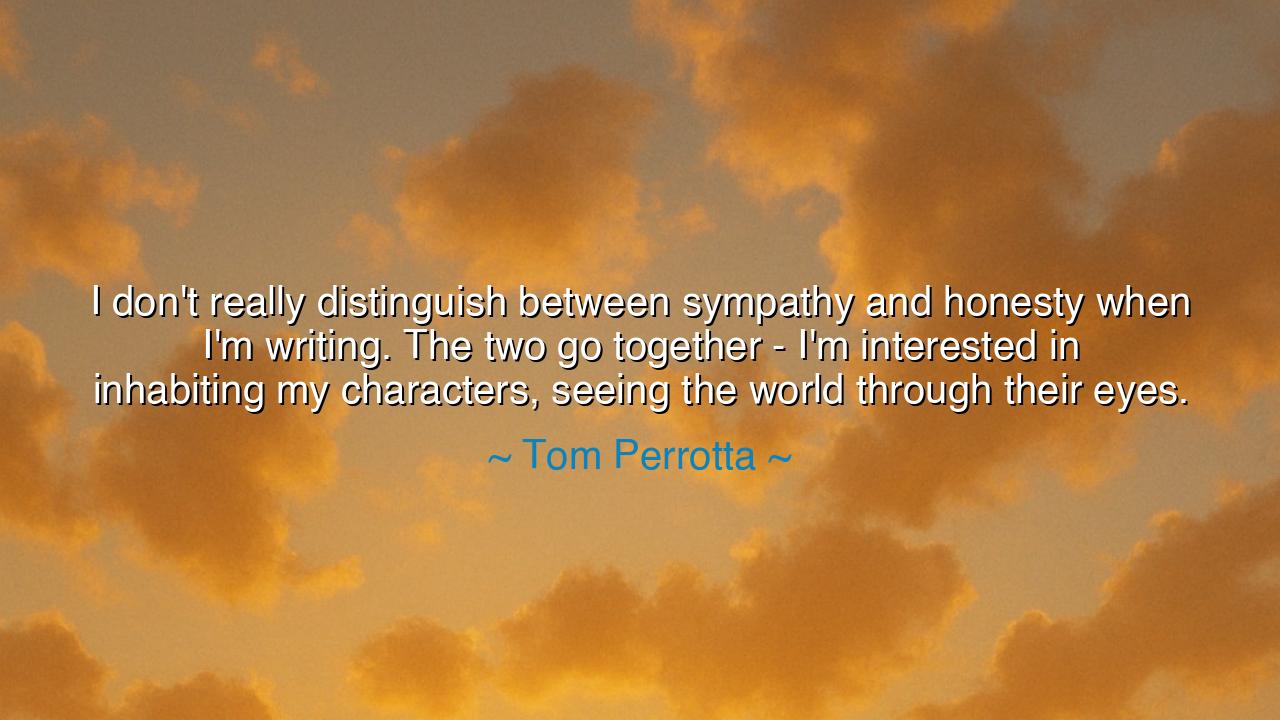
I don't really distinguish between sympathy and honesty when I'm
I don't really distinguish between sympathy and honesty when I'm writing. The two go together - I'm interested in inhabiting my characters, seeing the world through their eyes.






When Tom Perrotta declared, “I don't really distinguish between sympathy and honesty when I'm writing. The two go together—I'm interested in inhabiting my characters, seeing the world through their eyes,” he spoke to the eternal duty of the storyteller: to bear witness to the truth of another soul. His words remind us that sympathy and honesty are not rivals but companions, for to truly understand a character, or indeed any person, one must look upon them with both clear vision and a compassionate heart.
The heart of Perrotta’s statement lies in the act of inhabiting another’s perspective. To write with honesty is to strip away illusions, to show life as it is, with all its contradictions and flaws. Yet honesty without sympathy can become cruelty, a harsh light that exposes without mercy. Likewise, sympathy without honesty can become sentimentality, softening the truth until it loses meaning. Perrotta’s wisdom is that the two must walk together: sympathy tempers honesty, and honesty gives depth to sympathy.
History shows us the importance of this balance. Consider Charles Dickens, who wrote of the poor, the orphaned, and the outcast in Victorian England. His stories were filled with brutal honesty about suffering and injustice, yet they were infused with deep sympathy for his characters. Oliver Twist was not simply an orphan; he was a mirror of society’s failings, yet also a vessel of innocence and hope. Dickens’s gift was not only in telling the truth but in humanizing it, so that readers could no longer look away.
This teaching echoes even in ancient traditions. The great historians of Greece and Rome, from Herodotus to Tacitus, sought to capture not only the deeds of rulers but the inner struggles of men. Their works endure not merely because they catalogued events, but because they approached their subjects with a blend of unflinching honesty and a measure of sympathy for human weakness. They understood that to see through another’s eyes was to draw closer to truth itself, a truth too vast for cold detachment alone.
Perrotta’s words also serve as a warning for us in daily life. Too often we divide honesty and sympathy, believing we must choose between being truthful or being kind. But this is a false choice. True kindness is not the denial of truth, but its delivery with compassion. True truth is not the weaponization of facts, but the illumination of understanding. To live as Perrotta writes is to speak with both clarity and care, to look upon others not as objects to be judged but as lives to be understood.
The lesson, O seekers of wisdom, is that to understand another, you must live within their skin. This is the essence of storytelling, but it is also the essence of life itself. Whether in writing, in friendship, in family, or in leadership, strive to combine honesty with sympathy. Ask not only, What is the truth? but also, How can I hold this truth in a way that preserves dignity and deepens connection? In this balance lies the art of true human communication.
Practical action lies here: when you write, when you speak, when you listen, practice the union of sympathy and honesty. Try to see through the eyes of others, not to excuse their faults, but to understand their world. When faced with conflict, resist the urge to wield honesty as a blade; instead, offer it as a lantern, lit by the fire of sympathy. And when you show compassion, let it not be empty sentiment, but grounded in truth, so that it has the strength to endure.
Therefore, let Perrotta’s words endure as a guide for all who wish to tell stories and for all who wish to live wisely: sympathy and honesty are not separate virtues but one, joined in the act of truly seeing another. To inhabit another’s eyes is the highest form of art and the deepest form of humanity. And in doing so, we create not only literature but bridges of understanding that can transform the world.






AAdministratorAdministrator
Welcome, honored guests. Please leave a comment, we will respond soon